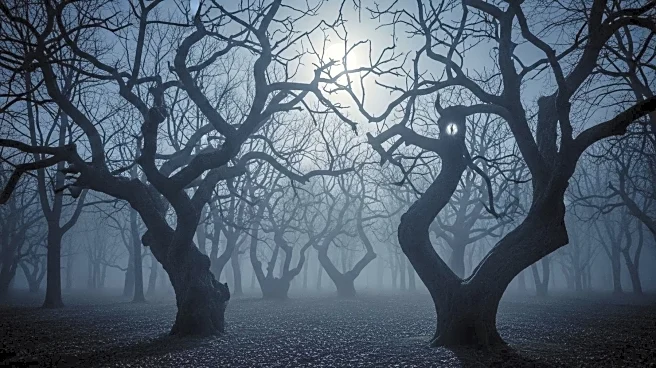What's Happening?
T. Kingfisher, a renowned author, discusses her latest horror novel, 'Wolf Worm,' set in North Carolina. Kingfisher's work often explores the unique and sometimes unsettling landscapes of the regions she writes about. Her fascination with North Carolina's dense forests, which differ significantly from the tall trees of the West Coast, inspired her to capture the strangeness of the environment in her writing. Kingfisher's previous novel, 'Snake-Eater,' set in the American Southwest, reflects her childhood experiences in Arizona, a landscape she describes as alien and hostile. The novel incorporates desert creatures as characters, including a were-javelina named Father Aguirre, who embodies a complex theological narrative. Kingfisher's work is characterized by her ability to blend regional landscapes with horror elements, creating stories that resonate with readers familiar with these environments.
Why It's Important?
Kingfisher's exploration of regional landscapes in horror fiction offers a fresh perspective on the genre, highlighting the significance of setting in storytelling. By incorporating elements of the North Carolina forests and the Arizona desert, Kingfisher provides readers with a unique experience that challenges conventional horror settings. Her work underscores the importance of environment in shaping narrative and character development, offering insights into how landscapes can influence human perception and behavior. This approach not only enriches the horror genre but also invites readers to consider the cultural and ecological aspects of the regions depicted, fostering a deeper appreciation for the diversity of American landscapes.
What's Next?
Kingfisher's continued exploration of diverse landscapes in her writing may inspire other authors to consider the role of setting in their own works. As she delves into the complexities of regional environments, her novels could prompt discussions among readers and writers about the interplay between geography and narrative. Additionally, Kingfisher's unique approach to horror may influence the genre, encouraging more stories that incorporate real-world settings and cultural elements. Her work could also lead to increased interest in the regions she writes about, potentially impacting tourism and local economies as readers seek to experience these landscapes firsthand.
Beyond the Headlines
Kingfisher's novels offer more than just horror; they provide a commentary on the relationship between humans and their environments. By depicting landscapes as both beautiful and threatening, her work raises questions about ecological preservation and the impact of human activity on natural settings. The inclusion of mythical creatures and spiritual elements in her stories also invites readers to explore the cultural significance of these landscapes, considering how folklore and tradition shape regional identities. Kingfisher's work challenges readers to reflect on their own connections to the environments they inhabit, fostering a deeper understanding of the cultural and ecological dynamics at play.











